
Sample (30 ug of whole cell lysate) A: HepG2 12% SDS PAGE GTX115439 diluted at 1:3000
MRPL28 antibody [N2C3]
GTX115439
ApplicationsWestern Blot, ImmunoHistoChemistry, ImmunoHistoChemistry Paraffin
Product group Antibodies
ReactivityHuman
TargetMRPL28
Overview
- SupplierGeneTex
- Product NameMRPL28 antibody [N2C3]
- Delivery Days Customer9
- Application Supplier NoteWB: 1:500-1:3000. IHC-P: 1:100-1:1000. *Optimal dilutions/concentrations should be determined by the researcher.Not tested in other applications.
- ApplicationsWestern Blot, ImmunoHistoChemistry, ImmunoHistoChemistry Paraffin
- CertificationResearch Use Only
- ClonalityPolyclonal
- Concentration0.7 mg/ml
- ConjugateUnconjugated
- Gene ID10573
- Target nameMRPL28
- Target descriptionmitochondrial ribosomal protein L28
- Target synonymsMAAT1, bL28m, p15, large ribosomal subunit protein bL28m, 39S ribosomal protein L28, mitochondrial, L28mt, MRP-L28, melanoma antigen p15, melanoma-associated antigen recognised by cytotoxic T lymphocytes, melanoma-associated antigen recognized by T-lymphocytes, mitochondrial large ribosomal subunit protein bL28m
- HostRabbit
- IsotypeIgG
- Protein IDQ13084
- Protein NameLarge ribosomal subunit protein bL28m
- Scientific DescriptionMammalian mitochondrial ribosomal proteins are encoded by nuclear genes and help in protein synthesis within the mitochondrion. Mitochondrial ribosomes (mitoribosomes) consist of a small 28S subunit and a large 39S subunit. They have an estimated 75% protein to rRNA composition compared to prokaryotic ribosomes, where this ratio is reversed. Another difference between mammalian mitoribosomes and prokaryotic ribosomes is that the latter contain a 5S rRNA. Among different species, the proteins comprising the mitoribosome differ greatly in sequence, and sometimes in biochemical properties, which prevents easy recognition by sequence homology. This gene encodes a 39S subunit protein, a part of which was originally isolated by its ability to recognize tyrosinase in an HLA-A24-restricted fashion. [provided by RefSeq]
- ReactivityHuman
- Storage Instruction-20°C or -80°C,2°C to 8°C
- UNSPSC41116161








